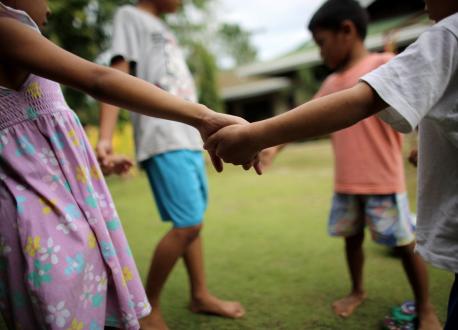
Interfaith Toolkit to End Trafficking
Communities of faith are important advocates for the protection of vulnerable groups and key players in preventing and ending the exploitation of children. That is why we developed an Interfaith Toolkit to End Trafficking to educate faith leaders, faith-based organizations, and houses of worship on the issue of human trafficking and equip them with the tools and resources they need to take action against it.
A belief in human dignity, a dedication to end injustice, and a commitment to care for the marginalized are core principles that unite all communities of faith. These principles are also essential in affecting change to end violence, exploitation, and human trafficking.
Faith-based organizations and religious groups are important partners in UNICEF's work to protect children across the globe. Communities of faith are important advocates for the rights and protection of vulnerable groups and key players in preventing and ending the exploitation of children. That is why we created an Interfaith Toolkit to End Trafficking—to better equip the communities that are well-positioned and motivated to address child trafficking and its root causes.
The purpose of the Interfaith Toolkit to End Trafficking is to educate faith leaders, faith-based organizations, and houses of worship on the issue of human trafficking and empower them with the tools and resources they need to take action against it. The toolkit highlights the values of several faith traditions, includes scriptural examples from major religious texts, and offers over 12 ways faith communities can combat human trafficking globally and locally.
Most importantly, the toolkit highlights and makes clear: we will not end child trafficking unless we all work together.
This understanding is best captured by the toolkit’s Interfaith Statement to End Trafficking that was written in collaboration by Islamic, Christian, Buddhist, Hindu, Jewish, and Unitarian Universalist leaders. It states:
Together, in honor of our faith traditions, we acknowledge that child trafficking and modern-day slavery violate the fundamental conviction that all people are equal and deserving of the same freedom, respect, and dignity. In solidarity with victims and survivors, we are determined to inspire spiritual and practical action by all global faiths to end the abuse, exploitation, and trafficking of all children everywhere.
Interfaith dialogue and collaboration are essential for addressing the trafficking and exploitation of the world’s children. By working together to leverage their moral influence, people across faith traditions are able to mobilize key stakeholders to better protect children. In addition, religious communities of all faiths have extensive networks with access to the most disenfranchised and vulnerable groups, such as those living as refugees and migrants. With this in mind, we hope this toolkit provides relevant guidance for faith communities and provides replicable ideas and examples of how faith actors can take collective action to end trafficking.
We look forward to witnessing the progress that communities – united and motivated by interfaith values – are able to achieve on behalf of the world’s children.
USA Version
In the USA? Check out the Interfaith Toolkit to End Trafficking and download a digital copy.
Global Version
Outside the USA? Check out the Interfaith Toolkit to End Trafficking and download a digital copy.
If you belong to a faith community and would like to share the ways this toolkit has impacted you, please email endtrafficking@unicefusa.org to provide your experience and feedback. We would love to highlight how your faith community is taking action to end trafficking.